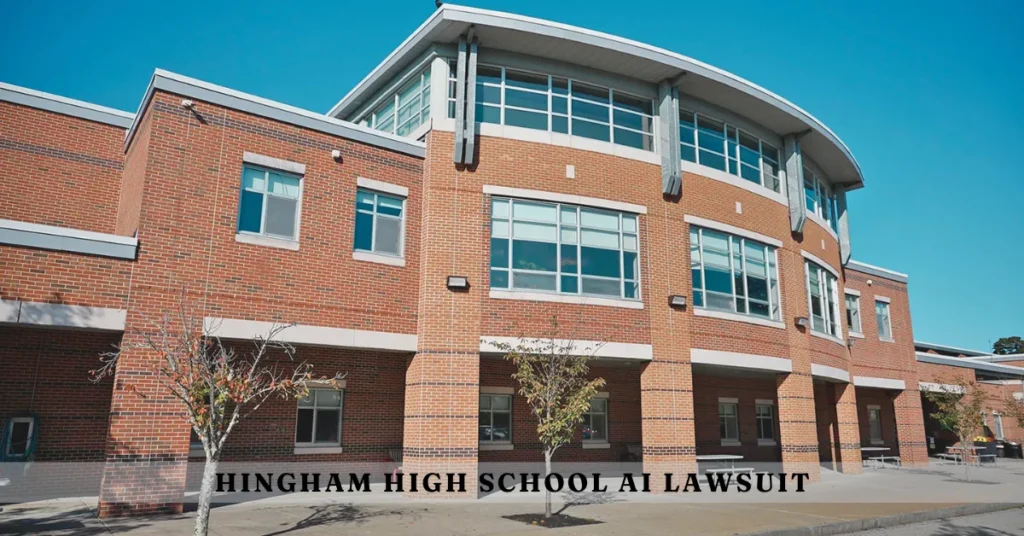Introduction to the Hingham High School AI Lawsuit
The Hingham High School AI lawsuit has sparked a conversation that reaches far beyond the classroom. As artificial intelligence becomes more integrated into educational environments, questions about privacy and data usage are coming to the forefront. Parents, students, and educators alike are grappling with how much information is being collected and what it means for their rights. This legal battle isn’t just about one school; it’s a reflection of growing concerns surrounding technology in education as a whole. Let’s dive deeper into this significant case and explore its implications for schools everywhere.
What is Artificial Intelligence (AI) and How is it Used in Schools?
Artificial Intelligence (AI) refers to computer systems designed to mimic human intelligence. This technology is reshaping various sectors, including education.
In schools, AI serves multiple purposes. It personalizes learning experiences for students, adapting lessons to fit individual needs and learning speeds. This helps educators address diverse student backgrounds effectively.
AI tools can also automate administrative tasks, such as grading assignments or managing schedules. By reducing the workload on teachers, they can focus more on teaching rather than paperwork.
Another significant application is in data analysis. Schools use AI to evaluate student performance trends over time. Such insights enable better decision-making regarding curriculum changes and resource allocation.
Additionally, chatbots provide instant support for students seeking help with homework or navigating school services. These virtual assistants enhance communication and accessibility within educational environments.
The Privacy Concerns Raised by the Lawsuit
The Hingham High School AI lawsuit highlights significant privacy issues. Parents and students are uneasy about how their data is collected and used.
AI systems often gather sensitive information, sometimes without clear consent. The lack of transparency in these processes raises eyebrows among educators and families alike.
Many worry that personal details might be misused or exposed to third parties. This fear extends beyond the classroom, affecting the overall trust in educational institutions.
Furthermore, there’s concern about potential bias in AI algorithms. If not properly managed, these biases could perpetuate inequalities among students.
As technology advances, it becomes increasingly crucial for schools to ensure that privacy rights are respected. Balancing innovation with ethical considerations is a challenge that must be addressed swiftly.
Data Collection and Usage in AI Technology
Data collection is a cornerstone of artificial intelligence technology. It fuels algorithms that learn and adapt over time, making them more effective in various applications.
In educational settings, AI can analyze student performance and tailor learning experiences. This process relies heavily on gathering data from multiple sources, including grades, attendance records, and even behavioral patterns.
However, the methods used to collect this information often raise eyebrows. Many students may not fully understand what data is being recorded or how it will be utilized later on.
This lack of transparency can lead to ethical dilemmas. Schools must navigate the fine line between leveraging AI for improvement and respecting individual privacy rights.
Moreover, once collected, data isn’t always securely managed. Breaches are inevitable if proper safeguards aren’t in place. The potential misuse of sensitive information poses risks that cannot be overlooked.
Other Cases of AI Lawsuits in Education
AI technology in education has sparked various legal challenges beyond the Hingham High School AI lawsuit. Schools across the country have faced scrutiny for using automated systems that inadvertently perpetuate bias.
One notable case involved a district that implemented an AI-driven grading system. Parents raised concerns about transparency and fairness, claiming it favored certain demographics over others. The consequences of such biases can shape student futures unfairly.
Similarly, another instance saw parents suing a school after their children were subjected to surveillance technologies powered by AI without proper consent. These cases highlight how emerging tech often outpaces regulatory frameworks meant to protect students’ rights.
As educational institutions increasingly integrate AI tools, these lawsuits underscore the pressing need for ethical considerations. Establishing guidelines will be crucial in navigating this evolving landscape while safeguarding privacy and equity within educational environments.
The Importance of Transparency and Consent in AI Implementation
Transparency is crucial when integrating AI into educational settings. Parents, students, and educators need to understand how these technologies function. Clear communication helps build trust among all stakeholders.
Consent plays a vital role in this equation. Schools must ensure that families are aware of what data is collected and how it will be used. This knowledge empowers parents to make informed choices about their children’s participation.
With the rapid evolution of AI tools, schools should adopt best practices that prioritize ethical standards. This includes regularly updating privacy policies and providing avenues for feedback from the community.
By fostering an environment where transparency and consent are prioritized, schools can mitigate fears surrounding privacy violations while embracing innovative learning solutions. Balancing these elements contributes to a more responsible approach to technology in education.
The Future of AI in Education: Balancing Innovation with Privacy Rights
The future of AI in education is filled with promise. Advanced technologies can personalize learning experiences, helping students reach their full potential. Imagine a classroom where each lesson adapts to individual needs, making learning more engaging.
However, this innovation comes with significant responsibility. Schools must tread carefully to ensure that the use of AI respects student privacy rights. Parents and educators alike are increasingly concerned about data collection practices.
Finding a balance between harnessing technology and safeguarding personal information is essential. Transparency becomes crucial in implementing any AI tool within educational settings.
Involving parents and students in conversations around consent will help build trust while fostering an environment conducive to growth. As we embrace technological advancements, prioritizing ethical considerations will lay the groundwork for effective education solutions moving forward.
Conclusion: The Need for Responsible and Ethical
The debate surrounding the Hingham High School AI lawsuit highlights a critical intersection of technology and privacy rights. As educational institutions increasingly adopt AI tools, the need for responsible practices becomes paramount.
Stakeholders must prioritize transparency in how data is collected, stored, and used. Parents and students should be informed about these processes to make educated decisions regarding participation. The conversation around consent is equally vital; individuals should have a say in whether their data contributes to AI development.
As we look ahead, balancing innovation with ethical considerations will shape the future landscape of education. Schools can harness AI’s potential while safeguarding student privacy through thoughtful policies and practices. A commitment to ethical standards not only fosters trust but also nurtures an environment where students can thrive without fear of unwarranted surveillance or data misuse.
Embracing advancements like artificial intelligence does not mean abandoning our responsibility toward individual rights. Instead, it calls for diligent oversight that prioritizes both progress and protection in educational settings across the nation.
ALSO READ: MyPascoConnect: All-In-One Platform for Education & Resources
FAQs
What is the “Hingham High School AI Lawsuit”?
The Hingham High School AI lawsuit is a legal case where a student challenges the use of AI surveillance in the school, raising concerns about privacy and data protection.
How is AI used in schools?
AI in schools personalizes learning, automates tasks like grading, analyzes student performance, and provides virtual assistance, improving educational efficiency.
What privacy issues are raised in the Hingham High School lawsuit?
The lawsuit highlights concerns about unauthorized data collection, surveillance, potential misuse of information, and the lack of transparency in AI systems.
Why is data transparency important in AI technology?
Transparency is essential to ensure students and parents understand how their data is used and to build trust between the school, families, and the technology providers.
How could the Hingham High School case affect other schools?
The lawsuit could set a precedent for the ethical use of AI in education, prompting schools to reassess their data collection practices and prioritize student privacy.







